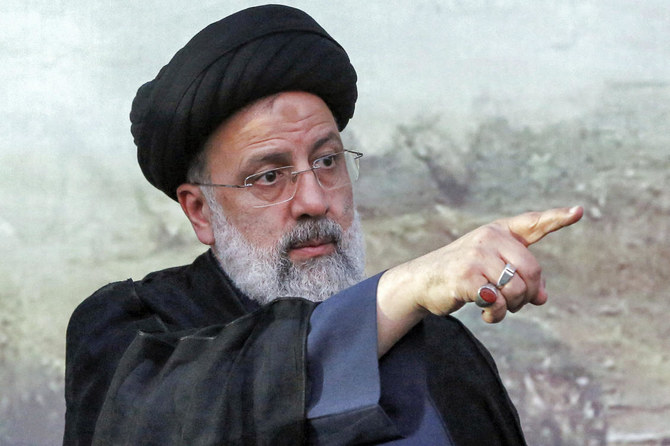JEDDAH: Amnesty International and Human Rights Watch said Ebrahim Raisi’s election as Iran’s new president was a blow for human rights and called for him to be investigated over his role in the extrajudicial executions of thousands of political prisoners in 1988.
“That Ebrahim Raisi has risen to the presidency instead of being investigated for the crimes against humanity, enforced disappearance and torture, is a grim reminder that impunity reigns supreme in Iran,” said London-based Amnesty Secretary-General Agnès Callamard, citing the group's report.
“In 2018, our organization documented how Ebrahim Raisi had been a member of the ‘death commission’ which forcibly disappeared and extrajudicially executed in secret thousands of political dissidents in Evin and Gohardasht prisons near Tehran in 1988. The circumstances surrounding the fate of the victims and the whereabouts of their bodies are, to this day, systematically concealed by the Iranian authorities, amounting to ongoing crimes against humanity.”
The report also said: “‘As Head of the Iranian Judiciary, Ebrahim Raisi has presided over a spiralling crackdown on human rights which has seen hundreds of peaceful dissidents, human rights defenders and members of persecuted minority groups arbitrarily detained.
“We continue to call for Ebrahim Raisi to be investigated for his involvement in past and ongoing crimes under international law, including by states that exercise universal jurisdiction,” she added.
Opinion
This section contains relevant reference points, placed in (Opinion field)
New York-based Human Rights Watch (HRW) echoed this. “Iranian authorities paved the way for Ebrahim Raisi to become president through repression and an unfair election,” Michael Page, deputy Middle East director at HRW, said.
“As head of Iran’s repressive judiciary, Raisi oversaw some of the most heinous crimes in Iran’s recent history, which deserve investigation and accountability rather than election to high office.”
Dr. Majid Rafizadeh, a Harvard-educated Iranian-American political scientist, told Arab News “With Raisi’s victory, Iran’s hard-liners will be controlling all the regime’s branches — the executive, legislative and the judiciary. The last time the hard-liners were in such a position was during Mahmoud Ahmadinejad’s presidency. Raisi will most likely choose members of radical organizations such as the Iranian Revolutionary Guard Corps, the Quds Force, the Ministry of Intelligence, and paramilitary groups Basij to fill his Cabinet.”
Maryam Rajavi, president-elect of the Paris-based National Council of Resistance of Iran, said: “Ebrahim Raisi, the henchman of the 1988 massacre and murderer of the Mujahedin-e-Khalq, is Khamenei’s final bid to preserve his regime. Weak, crisis-riddled, and rattled by looming uprisings, Khamenei purged all rivals to install Raisi as president, one of the vilest criminals against humanity since World War II.”
“There is no longer any justification for the international community to deal with, engage, or appease a regime whose president is a notorious criminal,” said Rajavi.
Reza Pahlavi, son of deposed shah Mohammad Reza Pahlavi and heir to the throne before the 1979 Islamic revolution, tweeted that Iranians had shown “unity and solidarity” by “boycotting and saying no to the authoritarian regime in Iran”.
Hadi Ghaemi, executive director of the New York-based Center for Human Rights in Iran, said that after a poll that was “not an election (but a) selection,” Raisi should not be absolved of his “long record of gross human rights violations.”
Describing him as a “major rights violator,” he said that as well as the 1988 killings, in two years as overall judiciary chief he “has been responsible for countless, severe violations of citizens’ rights.”
Dressed in a black turban and cleric’s coat, Raisi casts himself as an austere and pious figure and an corruption-fighting champion of the poor.
Critics charge the election was skewed in his favor as strong rivals were disqualified, but to his loyal supporters he is Iran’s best hope for standing up to the West and bringing relief from a deep economic crisis.
Raisi is not renowned for great charisma but, as head of the judiciary, has driven a popular campaign to prosecute corrupt officials.
Raisi is set to take over from moderate Hassan Rouhani in August.
(With AFP)





























